Symptoms of Bipolar Disorder
The Social Security Administration (SSA) will often provide benefits for your disorder if you have the symptoms they have predetermined as the symptoms that qualify you for Social Security benefits. The administration will take note of your symptoms, along with your medical records, testing and evaluations to determine if you qualify.
Some of the symptoms that can prohibit your ability to work include speaking faster than normal, increased changes in thoughts or ideas and being easily distracted. Other symptoms of bipolar disorder include the inability to sleep, being intentionally involved in risky activities, having a falsely increased self-esteem and being easily agitated. If these symptoms affect your day-to-day life, or your ability to work, you may qualify for Social Security benefits.
You will need to demonstrate that you are unable to do certain things and that your limitation is due to your disorder. For instance, you will need to show that you are unable to manage your day-to-day needs.
This can include not being able to finish tasks, the inability to understand instructions, the inability to interact with others socially or the inability to take care of yourself.
You can still qualify for benefits if you have been cared for by others, whether in a facility or through a structured environment created for you. You will have to show that you do not have the ability to adapt to any changes around you that are not already in your environment.
Time of Diagnosis
One consideration the administrators take into account is how long you have been suffering from bipolar disorder. You must have been unable to work consistently at a regular job for a specific period of time, which will be determined by the SSA.
If you are unable to hold down a job due to your bipolar disorder, you will need to show a pattern that demonstrates that your symptoms have prevented you from supporting yourself. If you earn more than $1,040 a month, you may be disqualified from Social Security disability benefits.
Your medical records can show varying levels of your illness and how you have either progressed or regressed. This record can help your case, so make sure your doctor frequently takes notes on your condition.
Even if your doctor believes you are improving, you can explain to the judge that you have good and bad days with the disorder. You will need to note how often the bad days are, one ideal way to keep track is keeping a daily journal where you can write your feelings from day to day. The longer you can keep the journal the better.
If you need assistance in getting SSDI benefits due to your bipolar disorder, contact the professional attorneys at Green Disability Law.



